Australian Tumbleweeds
Australia's most opinionated blog about comedy.
For a while there it looked like we were going to be in some serious trouble. Let’s set the scene: after years of struggling in the wilderness after the fizzle that was Micallef Tonight, followed by a few years of good solid game show hosting on Talkin’ ’bout Your Generation, Shaun Micallef had not one but two shows lined up on Australian television in 2013.
On Ten he has his new lightweight murder mystery series Mr & Mrs Murder, in which he and Kat Stewart play a married couple who making a living from cleaning up murder scenes and just happen to solve the actual murders in their spare time; on the ABC we have the return of Micallef’s news / sketch show Mad as Hell, in which he hosts a fake news show that’s really just an excuse for the kind of sketch comedy he’s been doing since The Micallef P(r)ogram(me) back in the late 1990s.
So far so good… only this is Australian television we’re talking about so some kind of shitfit is never all that far away. In this case, it took the form of scheduling: both shows start next week on Wednesday the 20th. And for a while there it looked likely that they’d both air at the exact same time: 8.30pm. Thankfully it’s not quite that bad, as the ABC are putting Mad as Hell to air at 8pm. So long as you’re quick with the remote, watching both should be doable. Phew.
Yes, Mad as Hell is going to be repeated the next day on ABC2 anyway; yes, if these shows didn’t both star Shaun Micallef most people wouldn’t see them as clashing with each other in any real way. One’s a flat-out comedy, the other is a fairly gentle murder mystery series. But they both star Micallef, so why split his (presumably large – the man has managed to get television series up and running on two separate networks after all) fanbase?
It basically boils down to this: while Australian television is on the air all day every day, there are only a limited amount of timeslots that are actually “in play” where a network can improve their ratings. For example, Seven currently owns Tuesday nights thanks to Packed to the Rafters and Winners & Losers; Nine owns Thursday nights thanks to the Footy Show. Monday night is a night everyone wants, hence all the big guns come out; Friday night is a night no-one really cares about because whoever has the sport usually does okay then.
And for quite a while the ABC owned Wednesday nights thanks to their comedy line-up anchored by Spicks & Specks and its’ million viewers a week. But the hosts of Spicks & Specks grew tired and hey, Andrew Denton reckons word-based game shows will be the next big thing and suddenly the ABC’s hold on Wednesday night was less of a death grip and more like a dead man’s hand. Ten, not so much sensing a weakness as hearing the ABC shouting it from the rooftops, has been screening their quality series – your Offsprings and your Puberty Blues, not to mention Micallef’s own Talkin’ ‘bout Your Generation – on Wednesday nights ever since in the hope of making it their time to shine.
So Micallef is (almost) the victim of a turf war, as both networks battle to claim Wednesday evenings as their own. As usual with Australian television, the losers are the viewers: while the Ten product isn’t exactly comedy, it’s about as close to comedy as commercial television seems likely to get without the words “Hamish & Andy” being thrown in there somewhere.
This is, of course, the whole point of the exercise: Ten wants viewers to have to choose, in the hope that they’ll choose their shows over the ABCs. Which would pretty much fuck local comedy into its long-prepared grave, as it would signal that viewers would rather watch light drama with a few laughs – which is what Micallef is delivering with Mr & Mrs Murder – than something that was more committed to being all-out funny. And if the ABC wins, comedy on the commercial networks becomes even more unlikely. Man, that “Whoever Wins, We Lose” tagline from Aliens vs Predator really is the gift that keeps on giving, isn’t it?
When did we get so massively oversensitive about comedy? That’s one of the questions that sprung to mind when we watched Shock Horror Aunty the other night. That and “Oh yeah, guess we’ve always been a bit oversensitive”. Or have we? There’s clearly a difference between prudish, often religious, types getting annoyed about “blasphemy”, and scummy Murdoch tabloids wilfully hyping-up a fairly obvious joke in order to sell papers. One of the differences being that blasphemy complaints against the Doug Anthony All Stars never got them taken off the air, whereas The Chaser’s cheeky re-imagining of the work of the Make A Wish Foundation did.
In a recent article for Fairfax, comedian Daniel Burt wrote of how the comedy he fell in love with, and the attitude that went with it, has now largely disappeared:
Australia’s once strong network culture of piss-taking and parody has been replaced by a scattered bunch of hopefuls firing off half-baked tweets, blogs and badly cut online videos with no foreseeable prospect of a unifying project to bring all the passion together.
The technology that makes so much overseas content available has also given domestic bean counters a reason to prioritise bottom lines over punch lines. What few opportunities there are tend to be given to faces that are well-entrenched and resourced. Australian television comedy is so lacking, it’s not even funny. Clive James was recently named an Officer in the Order of Australia (AO). If he were getting his start now, who would disagree that he is too fat, bald and smart for TV?
Life is a too short misery, alleviated by fleeting moments of glorious self-deception. Despite, or perhaps because of, the loneliness, otherwise sane people find themselves energised daily by a fresh outrage – usually a word or act not first sanctioned by them – which fuels paranoia and promotes the safe comedy of silliness, trivialities and group-think. The next person who apologises for a gag goes on my blacklist.
Australian ribbing has given way to tip-toeing, which doesn’t conform to our character or the comedy I fell in love with. Just when we need a sense of humour on TV, there’s a shortage of Australian comedy.
Burt is right; Australian television and Australian comedy has been cowed by a conservatism brought on by increased competition from new media and dwindling budgets. The vast majority of Australian TV comedy in recent years has played it safe, either by trying to ape successful overseas styles and formulas, or by positioning itself as so broad or so bland as to have a wide appeal. Quality has always been a problem, of course, but having to fight for several years to get your shows on air at all doesn’t give comedians and producers the opportunity to focus on what really matters – the scripts.
This is not to say that comedians whose mainstream television work leaves a lot to be desired can’t deliver the goods when they’re free to do so. Download the podcast A Rational Fear some time to hear Dan Ilic, Chris Taylor and others do some surprisingly biting and original satire. There’s no reason the same material couldn’t work on television, it’s more that no one in comedy seems to have the guts to try. Not after Make A Realistic Wish, anyway.
Perhaps we should look to the next generation, perhaps they’ll return Australian comedy to its glory days? They’ll be keen to cast aside the conservatism of the Howard era, and be “native” to the multimedia environment, right? The announcement last week of the senior creative team behind Jungleboy’s upcoming sketch show, which will showcase up-and-coming talent, was…interesting. Almost 100 sketches from new writers will be directed by the likes of Wayne Blair (The Sapphires), Christiaan and Connor Van Vuuren (The Bondi Hipsters), and Abe Forsythe (Laid). It could work, but as with many new talent projects this is more likely to be the start of something than a great comedy in and of itself, a D-Generation rather than a Late Show, if you like. But good luck to them anyway.
The only interesting thing about ABC chief Mark Scott’s admission last week – that part of the reason why Randling stunk was because they filmed it all in one batch to save money – was the “save money” part. Fun fact: nobody running a television network these days has any money and they all have hours and hours of airtime to fill that they can’t just clog up with cheap overseas imports because everyone’s already downloaded those. If you’re running a commercial network, the solution seems to be a whole bunch of reality shows: they’re cheap, they’re local so they can’t be pre-empted by downloads, and advertisers will pay for the whole thing for you so long as you slap their logo over everything on the show.
But if you’re the ABC that particular light entertainment door is closed to you (no ads on the ABC, thanks very much) so your cheap time-filler programming has to come from somewhere else. Hello Adam Zwar. Yes, we’re talking about The Agony Guide to Life, but why? In much – okay, exactly – the same way that the Gruen brand regularly changes its name to disguise the fact that nothing else about it is different, so to do we have an “all new” series of Agony Aunts / Uncles that to all intents and purposes is made up of deleted scenes from the last batch. Only with more talk about dead pets.
Yeah, okay, there are some tiny minor differences here. There’s a slightly greater chance you’ll already know the various faces because host / creator Zwar and the ABC have somehow found a way to drive this concept even more lowbrow: more famous faces! Who aren’t that famous because the show is still just Zwar turning up to people’s kitchens and asking them a bunch of generic interview questions lifted from a weekend newspaper supplement, but at least the threat of someone non-famous saying something interesting because they don’t have an image to protect has been defused.
Supposedly the subject matter has been broadened out here too, but seriously? We couldn’t tell. It’s the exact same globule of cod-wisdom spat out from the gaping maws of people famous entirely for being on television – so here they are on television again, which is the only reason why you should be listening to them. Some of them are actual comedians, but fortunately the good ones have their own shows so just watch them on those shows and forget this one exists.
SIDEBAR:
Here’s just how utterly pointless the Agony series of shows are: the only people talking them up are the Fairfax press (oh, and would-be Fairfax blogger Molks), which is odd because the Fairfax press is entirely in the business of promoting itself as a guide to what’s “cool” and “really going on” in today’s middlebrow Australia. They don’t talk about things people actually like – unless it’s to sneer at it why hi there My Kitchen Rules recaps – because their job is to tell you what you should be liking. Which sort of works when something is brand new, but Agony ran for sixteen weeks last year so it’s neither exciting or new so if they’re talking it up now (and they are), what’s their motive? At a guess, it’s because Zwar has brought to the ABC the kind of lightweight puffery Fairfax largely deals in these days, and the greater the acceptance of the “Five Questions For Sydney’s Top Tweeters” school of story, the greater the chance people might confuse The Age with something worth spending $2 on. Put another way: PAPER BUILT ON B-LIST CELEBRITY WORSHIP HAILS TV SERIES THAT WORSHIPS B-LIST CELEBRITIES.
END SIDEBAR
Even cheaper is Shock Horror Auntie, a clip show hosted by Craig Reucassel in which a bunch of supposedly “shocking” clips from the ABC’s vaults are dusted off to remind us all how much more grown up and mature we are these days. Great – so it’ll be Elle McFeast’s interview with Chopper Read, The Chaser’s “Make a Realistic Wish Foundation” sketch and that joke on The Micallef P(r)ogram(me) about Weary Dunlop where the punchline was the ABC switchboard basically exploding thus making it clear that the whole joke was that the sketch was MEANT to be “shocking”, right?
Of course not, though the Make a Wish sketch at least rates a mention. But there are a lot of clips from the Doug Anthony All Stars (if you drink every time Craig says “but this sketch from the Doug Anthony All Stars…”, you’ll be dead by the fifteen minute mark) and oh look, they’ve got a DVD coming out in a month or so, what a happy coincidence. No ads on the ABC, remember?
Elle McFeast talking about challenging politicians on “their character, their content and their credibility” might be a bit much to take, but on the whole there’s nothing wrong with a clip show like this when it’s digging out rarely seen stuff from The Dingo Principle and The Big Gig, because… well, it’s rarely seen comedy stuff. Two thumbs up from us. The commentary isn’t completely useless either: Denton talking about how today outrage has become a “spectator sport” is actually insightful, and Reucassel’s overview of the confusion between comedians making fun of bad behaviour and the actual behaviour itself makes sense.
As for the stuff that’s already available on DVD – John Safran’s various work for one – well, that’s already out there. Review with Myles Barlow isn’t exactly a long-forgotten gem, and the Chaser stuff is hardly missing in action (“The Eulogy Song”). Still, for the most part they’re at least illustrating a point: sketches about hurting animals always generate outrage, DAAS threatened their audience a lot, blasphemy still riles up the viewers, and so on. Which puts this a notch above the usual clip show hijinks – or the average episode of Gruen – and makes it slightly more than the sum of its parts.
You know what we’d like? If the ABC would put the entire episodes of the offending shows up on the internet so we could see the whole thing. Of course, that would defeat the entire purpose of having a clip show – you can’t get people to watch snippets of shows when they can easily check out the whole entire thing, which is why the sitcom clip show episode largely died out once they started selling DVDs of entire seasons – but it’s not like the ABC is running clip shows seven nights a week. Not yet at least…
So it seems the rumours are true: Clarke & Dawe and 7.30 have broken up:
It’s been rumoured for some time and now it’s clear, John Clarke and Bryan Dawe have been dropped by ABC’s 7:30, but have been retained in a weekly stand-alone comedy spot.
They will now be seen at the new time of 6:56pm Thursdays on ABC1.
Good news or bad? As usual, it depends: on the one hand, at least they’re still on the ABC and being divorced from the increasingly shrill and scattershot 7.30 isn’t automatically the worst thing ever.
On the other, this is directly out of the “dammit, we can’t just dump them” handbook. Shunt them off for a while to a graveyard timeslot – the “sexy new time” of 6.56pm isn’t exactly a ratings goldmine – and then when everyone’s forgotten about them quietly shut the door. Which, considering the ABC’s current obsession with churning out no-budget comedy, seems a little odd. What’s cheaper than two guys and a couple of chairs? Presumably on The Agony Guide to Life the guests bring their own chairs.
Basically, Clarke & Dawe have been put on notice. As it stands, it’s clear the ABC just isn’t interested in their brand of comedy any more. And if the audience still is… well, we’ll soon see about that once the audience has to put in some effort just to find them. Still, at least we have time to let the ABC know how we feel about this. Let the letter-writing campaign begin!
From the department of No Shit, Sherlock, comes this startling admission from ABC chief Mark Scott:
Scott told Mumbrella’s sister title Encore: “One of the things we did with Randling that we learned from, and this was partly a budget thing, was that we locked all that away. It was all locked away before it went to air. If we had been broadcasting it as we were making it, we probably would have fine tuned it along the way and we weren’t able to.”
That said, unless the “fine-tuning” involved ditching both the host and the concept, we kinda get the feeling things would have played out pretty much the same. But aww, isn’t it nice that the ABC boss is willing to divert attention from the show’s many other failings and shift the blame for it tanking onto something that never gets mentioned as a plus or a minus for any other ABC show? Seriously, when a show rates its arse off does the ABC ever say “it should, we sunk a bloody fortune into it”? Has there been any other dud that’s received the “don’t blame the show, we should have spent more money on it” get out of jail free card in recent memory? Jesus Christ, that hold Denton has over the ABC must be one hell of a headlock.
*
In further shocking news, today’s Melbourne Herald-Sun ran this in their “Confidential” section:
Matt Tilley and his popular “Gotcha” calls are no more, after the royal prank call scandal.
Wait, the royal prank call scandal killed Matt Tilley? YEEEEAAAAAA-oh wait, they just mean his prank calls are no more. Damn you, dead UK nurse, for depriving innocent fun-loving Victorians of Matt Tilley’s “popular” phone abuse. Let’s continue:
Fox FM will not broadcast the calls on its breakfast show this year, and probably never again. The dumping of the Gotcha pranks came after British nurse Jacintha Saldanha took her own life soon after taking a call from Sydney radio hosts Michael Christian and Mel Grieg … Tilley and Fox FM have been doing the calls for years, releasing a number of CDs that have performed well on the ARIA charts. Fox FM’s parent company Austereo announced in December that the company would suspend all prank calls. This ban now looks like being permanent.
And then, just when you think you’re reading a story that might as well be headlined “SYDNEY RADIO KILLERS MURDER MELBOURNE’S FUN”, there’s this:
Nothing has been heard from Grieg or Christian since they did interviews soon after the scandal broke in December. It seemed they were scapegoats in the affair, as little was heard from the content producers or directors who would have approved the prank call.
Which, by the Herald-Sun‘s standards, is actually almost insightful. Even if it is just calling for the real culprits to stick their heads up so they can have a kick at them.
While we were getting all worked-up about the likes of Balls of Steel Australia and The Janoskians for the 2012 Australian Tumbleweed Awards, The Comedy Channel started airing their latest “original” pranks show Off Their Rockers. Based on the American program Betty White’s Off Their Rockers, which in turn was based on the Belgian program Benidorm Bastards, Off Their Rockers sees a gang of senior citizens hitting the streets of Sydney, doing unexpected things in front of the public.
The ensuing hilarity is linked by sports commentator Sam Kekovich, who helpfully explains the premise (because presumably we’re too stupid to spot it ourselves): this show features a bunch of oldies behaving like teenagers. Cue 30 minutes of home video camera footage of elderly people snogging in the street, smoking reefers in the park, and asking for Cowboy Cocksuckers in pubs.
As a throwaway piece of summertime TV aimed at bored people this is just about acceptable. And unlike shows such as Balls of Steel Australia, at least the laughs come from the ludicrousness of the old timers’ behaviour and the bewildered reactions of the young people in their vicinity rather than the mean-spirited targeting of innocent passers-by: two elderly women walking past a building site yelling “Show us your tits!” at the builders makes the builders laugh – no one’s being harmed there.
What is irritating about Off The Rockers is the shooting style. The pranks themselves are quick and done reasonably well, but then the seniors walk out of shot and the camera closes in on the group of teens who happened to be sitting nearby. And then stays there for ages. The editor’s even slowed that part of the footage down to emphasise how bewildering/hilarious the teens found the oldies’ antics. And what with that and Kekovich’s pointless narration it feels like the makers of the show are trying to make a small amount of footage go a lot further than it should, which for a show which probably cost about $1.50 to make seems penny-pinching in the extreme.

Australian comedy in 2012 existed. It happened. It took place. We’d love to get more excited about it, but with a handful of exceptions – and even those programs were just more of the same from established figures – this was a year of shrugged shoulders and mumbled “whatevers”. Unlike 2011, where Live From Planet Earth was the kind of high profile car crash that could easily throw the very idea of television comedy through the windshield and into a nearby pond where it’d be impaled on the rusting remains of the last high profile commercial comedy car crash (let’s say, oh… Let Loose Live), this year commercial television played it safe and refused to air any comedy that didn’t come with a brand name attached. And even then, if that brand name was “The Chaser” it was given a throw-away timeslot late Thursday nights and eventually burnt off in two-episode batches. But at least all of The Unbelievable Truth went to air, and at least Hamish & Andy’s various Gap Years rated okay: for commercial television then, comedy managed to hang on by the skin of its increasingly decaying teeth for yet another year. Oh, and while nobody actually watched Ed Kavalee’s Scumbus, that was their loss, as it was easily the funniest Australian comedy to air on commercial television in 2012. Damning with faint praise yet again: that’s why you come to the Tumbleweeds.
Over on the ABC (SBS’s efforts consisted of the one joke parody Danger 5 and the no-joke swearing of whatever shout-fest it was Paul Fenech did this year) the National Broadcaster went out of their way to ensure nobody was excited about comedy in any way shape or form. Their best shows – Shaun Micallef’s Mad as Hell and The Hamster Wheel – involved trained professionals doing a very good job of something they’d already done. Everything else swung firmly for the middlebrow suburbs and either hit with a dull thud – hello A Moody Christmas – or splattered everywhere like a bag of shit. The fact that there was sixteen weeks in prime time of Agony Uncles / Aunts, AKA Adam Zwar’s filmed version of a Sunday tabloid puff piece, was grim enough; having the ABC and the Farifax press act like this was something to be proud of insulted the intelligence of every single Australian old enough to sit upright. Still, it is hard to fault Auntie for wanting to stick to the softball lobs when it comes to comedy, because everything else they tried was complete crap. It’d be easy to say the problem with Laid 2 was that it was made for and by unpleasant self-obsessives, but really it was made because once upon a time Marieke Hardy was seen as someone people were interested in. Doesn’t that seem so long ago now? Problems was a useful reminder that Sam Simmons’ hasn’t changed his act since he was shouting “ducks” over and over back in 2006, and as for Randling…
Look, Andrew Denton was amazingly lucky that Randling aired in 2012. If it had been a better year for comedy it would have been dumped in a graveyard timeslot the second it became obvious that the actuality of a “word based game show” was as fatal to the concept of entertainment as the phrase “word-based game show”; if it had been a worse year the lingering stench of this utterly misguided bucket of rotting tripe just might have killed off the whole idea of comedy on the ABC. As it stands, it was just plain embarrassing seeing it drag on and on and on for twenty-seven weeks of “anyone watching? Nope? Oh well, see you next week then” simply because the ABC thought the viewing public were as much in love with Andrew Denton as Andrew Denton is.
But in the end, even a massive failure on every possible level such as Randling was largely brushed off with a shrug. No-one cares about Australian comedy at the moment; even the “adventurous” material like Outland, The Strange Calls and yes, Problems only ventured outside the lines in ways that were mostly safe and familiar (Outland was about gay science fiction fans, which might have been fresh in a world where The Big Bang Theory hadn’t made nerd comedy mainstream five years earlier; The Strange Calls was basically a re-tread of the 2003 series Fat Cow Motel from the same production company; Problems was the same laugh-free random LOL Simmons has been doing since his jTV days). Whatever the many, many problems with Live From Planet Earth, at least it got people talking about comedy in 2011; in contrast 2012 was as silent as the grave.
But why so glum – there’s awards to be given out! Of course, the awards are largely pointing out the many reasons we have to be glum, but, uh… eh, let’s just get this show on the road. The envelopes, please…


After years of making endless “a comedian explores…” shows, Myf Warhurst’s Nice was the only example of this genre on the ABC this year. Not that Myf’s really a comedian or that the show was really a comedy. Nice is only really worth noting here because it seems to mark a shift away from comedy and toward a bland earnestness in this well-established format. Joe Hildebrand’s Dumb, Drunk and Racist took this even further, being a serious show dealing with a serious topic, yet still being full of stunts and comedy-style moments. Perhaps all TV shows – even the news – will be like this in a few years’ time. Oh wait, they kinda already are.

Sam Simmons is a man with a firm vision of what comedy can be. Unfortunately, “funny” isn’t part of it. He wants to disturb and unsettle you, confront you and make you think, and while there’s been nothing all that disturbing or unsettling about a physically unpleasant man in a variety of socially awkward situations since George & Mildred, Problems did at least confront us with the concept that someone might find a bunch of tossed-off songs about office equipment a worthwhile way to spend their time. As for what he made us think, let’s just say there’s a reason why “smart and funny” is a compliment while “awkward and uncomfortable” is usually a reason to get away as fast as possible.
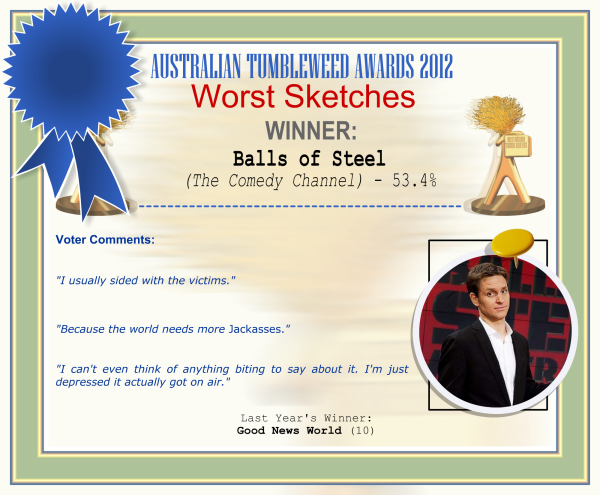
The second series of The Comedy Channel’s Balls of Steel Australia was the runaway winner of the Tumblie for Worst Sketches but describing that program’s output as “sketches” seems over-generous. Sketches, strictly speaking, are scripted. Getting some hot twins to take their clothes off in a public place isn’t exactly a sketch. It’s barely even a premise. In a world full of internet porn, it’s hardly even a reason to go “phwooor”.


2012 was perhaps the year of Adam Zwar, who produced three programs so forgettable that two of them barely scraped into the Tumblies categories they were nominated in…even though they were shit. The second series of Zwar’s sitcom Lowdown at least gets points for effort in that it had scripts and characters and costumes and stuff like that. He was presumably too busy cutting-together the least worst observations of the Agony Aunts and Agony Uncles to make it worth watching, though.

One of the seemingly endless list of problems Australian comedy has next to no idea how to deal with is making sure every single part of your comedy is funny. It’s not enough to come up with a hilarious premise: you then have to come up with funny characters, funny scenes, funny lines, funny expressions, funny moments of silence, and then do it all again next week. Often Outland felt like “Hey, gay people are funny, nerds are funny – let’s break for lunch”. There are ways to make dildos funny, but throwing a big black rubber one around in slow motion isn’t one of them.
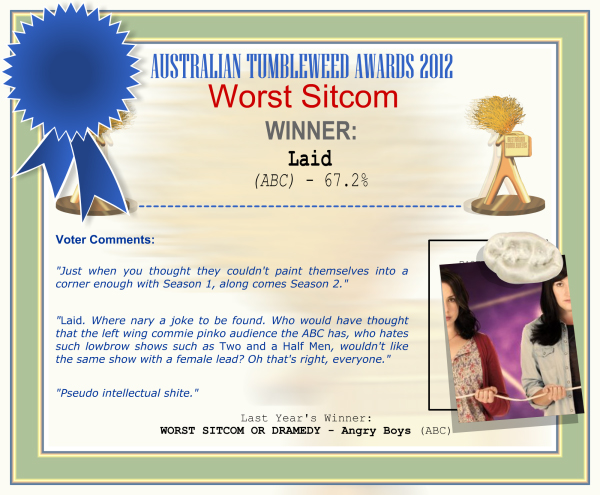
We’ve been banging on about Laid for a long time now – oh alright, here’s a quick summary: thanks to a decades-long career of self-promotion coupled with the advantages of having TV producer parents and a famous literary figure for a grandfather, Laid creator Marieke Hardy launched her first sitcom with a wave of publicity (largely from her employer, Fairfax) unrivalled in the annals of Australian television. The show tanked, largely because it was creepy and sad and somewhat confused about what it was saying. So of course, it got a second series, which was more of the same only with slightly less fanfare from the slowly backing away Fairfax and even less viewers thanks to no-one liking it the first time around. It’s hard to know what was worse: the fact this crap got a second series or the fact the second series had even less happening than the first. Ha ha, only joking: the worst bit was the hilarious comedy rape scene where our heroine Roo tried to have sex with a man she’d drugged into unconsciousness by creating an icy pole splint for his non-erect dick. That’s right, this was a show that “went there”; lucky no-one was watching by that episode or the ABC might have had to answer questions as to exactly how rape is funny.


It’s hard to believe that Triple M Melbourne’s Rush Hour – Going For Gold was a finalist in this category. Perhaps some of our voters mistook the two-week Olympics series hosted by Santo Cilauro and Sam Pang for the regular Rush Hour drive shift hosted by James Brayshaw and Billy Brownless? Understandable if the votes were for Brayshaw and Brownless, unbelievable if they were for Cilauro and Pang, who brought with them the kind of laughs Triple M hasn’t allowed on air since it axed The Sweetest Plum, or Get This.

Making some Gruen specials on theme of the Olympics was always going to be a fail – the Gruen franchise has put its cack-handed spin on everything remotely interesting about marketing and advertising already, so why would shows about Olympics marketing and advertising be an improvement? That didn’t stop them stating the obvious for roughly the seven millionth time, mind you: what’s that? Sports and advertising are firmly linked? You don’t say.
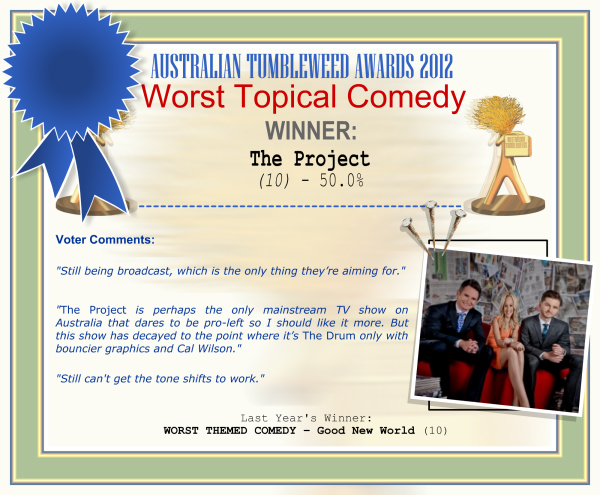
The Project, one of the hangovers from Channel 10’s now almost dead initiative to get viewers in through its news programs, was mostly recently watched by one of the Tumblies writers when they were in a state of severe jetlag following an international flight. It was still more stimulating than that evening’s National Nine News, but that’s probably because Peter Overton doesn’t have a studio audience who’ll whoop or laugh loudly at everything. Yet. And while Charlie Pickering has been receiving praise from the twitteratti for serving it up to Bob Katter recently, that’s largely due to him taking his skill set – coming across as a smug, smarmy, somewhat unpleasant careerist – away from comedy and into the only realm where those flaws could possibly be considered positives: political interviewing.


Agony Uncles (and for that matter Agony Aunts) featured a grab bag of comedians and personalities giving their savagely edited and scarcely thought-out views on a range of non-issues. If you enjoyed them they’ll be back this year in The Agony Guide To Life…we can’t be the only ones wondering if The Agony Guide To Life is a compilation of off-cuts from Agony Aunts and Agony Uncles, can we?

Did anyone bother watching the “all new” Can of Worms in 2012? The buzz the series received in 2011 seemed to have disappeared with original hosts Ian “Dicko” Dickson and Meshel Laurie… not that either of them were necessarily better than new host Chrissie Swan. Can of Worms series 2 may have been technically better – i.e. they’d found someone to edit it who had experience of editing – but with its all new cuddly feel it delivered less laughs and less debate than the original, which we admit is an achievement.
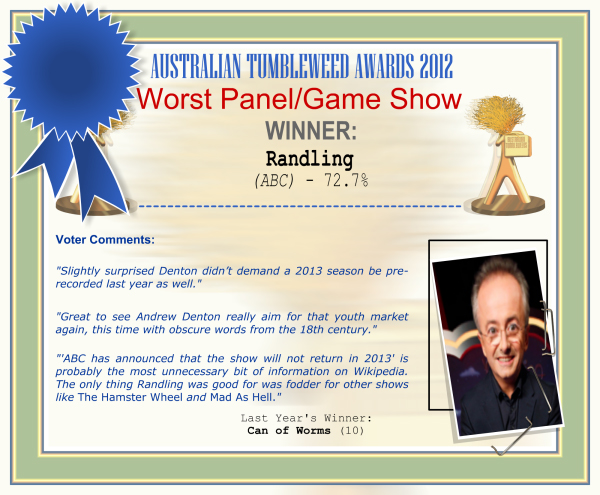
To be fair to the ABC, it’s easy to see why they invested in a bulk order of a cheap comedy game show hosted by Andrew Denton: they’re staffed by nitwits. First rule of bargain hunting; it’s not a bargain if it doesn’t work, and this word-based game show was… shit, we keep going on about it, but what planet do you have to be living on to find the term “word-based game show” anything but a giant neon sign blaring WRONG WAY GO BACK. Not to mention Denton’s personal charm exists solely in the mind of one A. Denton Esquire. Throw in the frankly moronic decision to make scoring a vital part of a comedy game show alongside the colossal blunder that was filming all 27 episodes before even airing one so no changes could be made if the show turned out to be a turd which a-ha-ha-ha it was from day one, and what’s left is the kind of mistake that on a commercial network – or a government one that didn’t hold its audience in contempt – would see pretty much everyone involved on the management side fired. We saw this mistake coming and we’re dickheads on the internet; what does it say that the professionals didn’t?


Any Questions For Ben?… or as it’s better known, “The Melbourne Tourism Board Promotional Video That Walks Like A Man”, was Working Dog’s big return to feature film making after their one massive hit (The Castle) and that one that never really cut it overseas (The Dish). Why Working Dog felt anyone would want to see a movie about a smug git with no problems wandering around wondering if he had any problems remains a mystery. Wait, no it doesn’t: they wanted to make a movie involving a lot of good-looking people having lots of fun and they never quite figured out a way to make anyone give a shit about them. But look! Aerial shots of Melbourne! It’s a glamourous, modern city where anything can happen! As long as it’s not funny.

While Kath & Kim died as a comedy concept around halfway through series two, they live on as “personalities” – you know, they turn up, dump a few catchphrases, fail to develop as characters in any way, everyone goes home happy. Only that’s not really enough to sustain a feature-length film, especially one that for some odd reason (*cough funding deal cough*) was largely set 5,000 kilometres from the only place on the planet where they were actually funny. But it did feature Rob Sitch and Glenn Robbins having a swordfight, which for comedy fans of a certain vintage makes it at least worth a night’s rental.

When SBS dawdled over funding another series of Housos, creator Paul Fenech decided to go it on his own and make a movie, which distributor Paramount picked up for Australian distribution. Whatever you think of his product – don’t bother thinking about it, it’s crap – you have to be impressed by the way he keeps on finding people willing to dump his rubbish in front of the Australian public. Why did SBS fund the first series? Why did Paramount agree to put it in cinemas? Why won’t the nightmare end?


Jungleboys.tv is the website from the team who brought us Review with Myles Barlow and A Moody Christmas. Announced with much fanfare at the end of 2011, it’s a sort of Australian answer to Funny or Die, and over the past year or so it’s been running a sketch writing competition and seeking new writers for an upcoming ABC1 show. This is more than any of the TV or radio networks can be bothered to do – apart from commissioning the occasional sketch show or getting involved in the occasional new talent initiative, they’re pretty much happy to let sketch and new writing die on its arse. We here at Australian Tumbleweeds are always in favour of schemes like this, even if the initial results are usually pretty poor. There’s not much hilarity to be found in the sketches on the Jungleboys website, but on the other hand the comedians of tomorrow have to start somewhere…

One of the great media themes of 2012 was trolling or cyber bullying, and even online teen sensations The Janoskians had to get their lawyers to serve a troll who’d be harassing them with an intervention order. But wait, isn’t that the same Janoskians whose fame is based on their prank videos, such as this one in which they block a public road and force motorists stop their cars, or this one where they annoy and harass people on trains and in shopping malls? We’re not saying the racism and abuse directed at The Janoskians online was right or justified – it wasn’t – but there’s still a fairly hefty irony here.
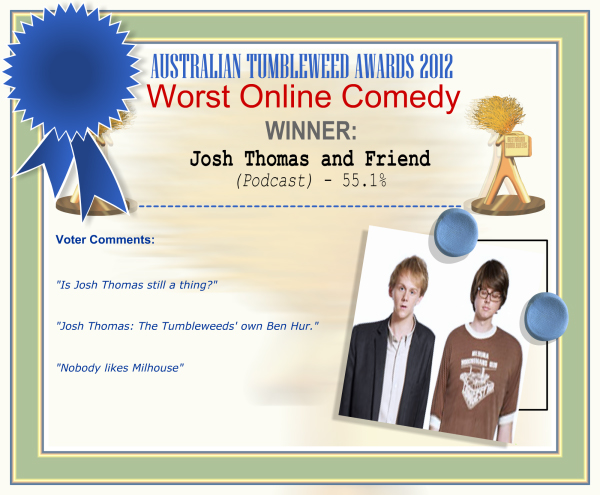
For a comedian whose TV profile was relatively low in 2012 – he appeared in 10 episodes of Talkin’ ‘bout Your Generation and one episode of The Project – Josh Thomas has managed to annoy our voters so much that he got two Tumblies nominations this year. Along with Tom Ward he wins this award for Josh Thomas and Friend, a podcast of which only two episodes were made in 2012. As in previous podcasts, the duo rambled on in their tedious post-Gervais way about gay sex and other supposedly controversial subjects. Don’t bother to download it.


Wait, Denton has a personality now? We were going to make the joke in our previous sentence about him having talent, but seriously, if he was able to sell the ABC on buying 27 episodes sight unseen of a “word-based game show”, he must be one hell of a salesman. Or, you know, the ABC might have failed to notice that in any situation where the focus is on Denton he never fails to come off as the kind of self-satisfied knob who you only ever see at dinner parties because if he went down the pub someone would glass him within twenty minutes.

For all her constant talk about the numerous writing projects she’s got on the go in Hollywood, anyone with even the smallest soft spot in their hearts for Rebel Wilson – and she’s been in enough semi-decent US films by now to have generated at least some minor goodwill – must be hoping desperately that she never gets any of them up and running. That’s because she is a one-note performer who only works in small doses in films where she provides contrast to the main goings on. If you put her – well, her current comedy persona, which she hasn’t changed since her days on Pizza so we’re going to stick with “one note performer” – at the centre of something, she quickly becomes as much fun as chewing tinfoil. And we’ve got the DVD of Bogan Pride to prove it.
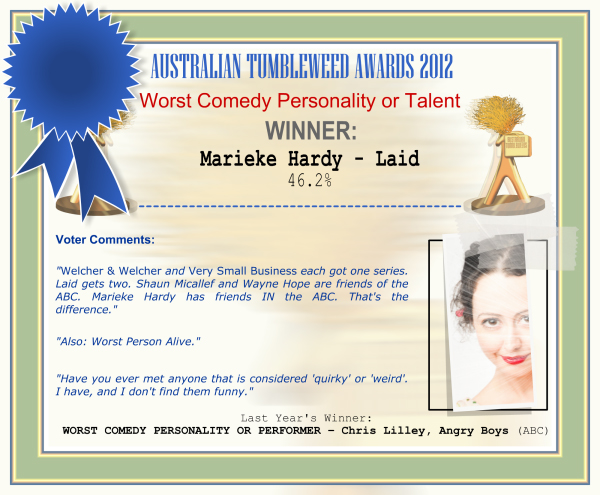
Marieke Hardy is in the Marieke Hardy business, but in 2012 the share price was looking a little soft. It’s fair to say that in 2011 her reach finally exceeded her grasp, thanks to the one-two punch of actually getting a television show up based largely on “Marieke Hardy” only to have it tank in the ratings, and outing her online nemesis only to direct her hate-filled fanbase to the wrong man who then secured an apology and a big cash payout. In hindsight, even for Hardy a second series of Laid was a bad idea: it was never going to be an improvement on the first, and serving up another six episodes of creepy self-loathing disguised as comedy only underlined the fact that Hardy was much more convincing at telling people she was one of Australia’s great comedy talents when she hadn’t written any comedy.


News Ltd employs two kinds of television critics: the ones who actually cover television, and the ones who get angry about it on the readers behalf. Colin Vickery falls into the second category. That upcoming ABC series about all the “shocking” comedy moments from the past that don’t really seem even remotely shocking to anyone with a functioning sense of humour? Vickery is the person who decided – on the community’s behalf – that they were shocking. Not personally, mind you: he just slotted into a person-shaped groove and started spitting out the same “Young people are disrespectful to our cherished institutions!” guff his employers have been running since 1911.

Here’s the thing about we critics: we all know that our opinions are just that – opinions – but if you constantly keep saying “who cares, it’s just an opinion” every time you state your opinion, you’re insulting your readers. They know it’s just an opinion: shut up and tell them yours so they can decide whether they agree or not. So if you’re Ben Pobjie running around constantly qualifying every opinion with “hey, it’s just my opinion”, you’re basically telling your audience “I think I’m so awesomely persuasive you idiots are going to think I’m your New God unless I explain that you’re free to disagree with me”. Or maybe Pobjie just doesn’t want to piss off any of his media buddies by standing behind his reviews when he says that they may have made a piece of television that’s less than utterly awesome. Guess we’ll never know, because to date he’s never dared hint any of his media chums have ever done anything that was less than utterly awesome. The technical term for that last sentence is “a fact”, by the way. Those tweets where he and Marieke Hardy give each other online warm fuzzies are pretty funny though. Hey, it’s just our opinion.
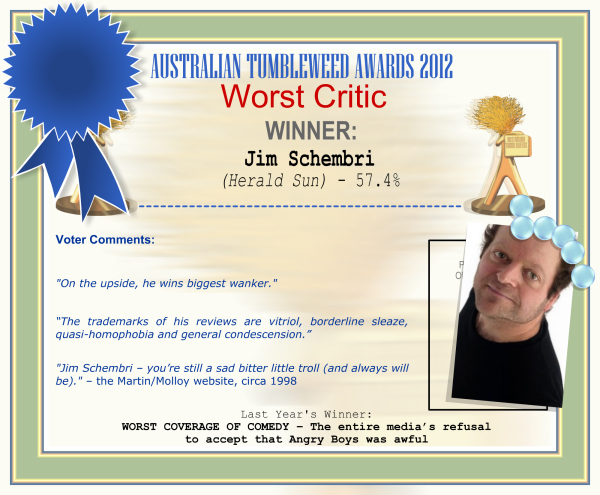
Aw, remember Jim Schembri? Notorious film and television reviewer who quit The Age after it was discovered he spent his spare time threatening anyone who mentioned his name online with legal action? A brief stint covering the Melbourne International Comedy Festival for the Herald Sun brought him to our attention this year, though it seems his dalliance with News Ltd was a brief one: he’s currently the film critic/blogger for Melbourne station 3AW, which is owned by his former employers Fairfax. So don’t worry about Jim and his “controversial” opinions; he’ll be back shouting “look at me!” before you know it.


Perhaps our voter who described Josh Thomas as “The Tumbleweeds’ own Ben-Hur” is right – we here at Tumblies Central are blowing Thomas’ impact out of all proportion. Then again his six-episode sitcom Please Like Me is coming soon, and it’s so good it’s been delayed for at least a year and has been demoted from ABC-1 to ABC-2. Perhaps Thomas’ comedy genius is the Ben-Hur in the room?

We’re already hearing rumours that the reason why Chris Lilley hasn’t come up with a name for his new show yet is because it – and everything else he ever does from here on in – is just going to be called “Chris Lilley”. It’s not like anything else he’s done really needed separate names: same soaring theme music (written by Lilley), same awkward/offensive characters (played by Lilley), same scripts that veer wildly between schoolyard humour and blatant mawkishness (written by Lilley), same bloated run time as maybe three episodes of material is dragged out over eight or more weeks (edited by Lilley). Going by the way the ABC is hailing his return (announced for 2013 but come on: if he doesn’t even have a title yet, this is a 2014 release at least) on bended knee it seems the fizzle that was Angry Boys has been all but forgotten: hopefully his teen girl fanbase won’t have forgotten him too.
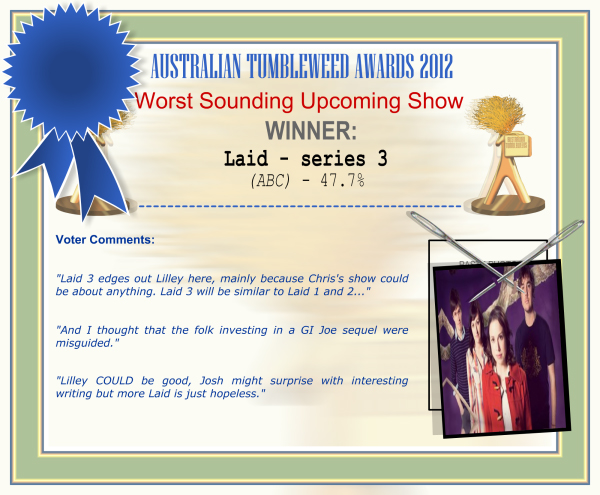
It’s not exactly surprising then that the news of a planned third series of Laid resulted in much wailing and gnashing of teeth. What was surprising was that this rumoured third series wasn’t being rumoured by the ABC itself, but by Film Victoria, who announced in their fiction funding decisions for 2011/2012 that they were giving Producer Andy Walker and writers Marieke Hardy and Kirsty Fisher the amount of $18,208 to develop a third season. We’re not experts on television development, but having already made two series of Laid, surely the show had been “developed” about as much as it was going to get? More importantly, considering up to that point – and at every point afterward – there’d been no word whatsoever from the ABC about their having the slightest interest in making a third series of Laid, why give them money to develop something there was no demand for? Not only had the show – written by the people collecting the development cash, so they can’t exactly claim ignorance here – wrapped up every single dangling plot thread by the end of series two, but its ratings had been so amazingly poor (three words: worse than Randling) that bringing it back yet again would have been little more than a signed confession by the programming department that they didn’t give a shit if anyone watched the ABC. But if you can find a funding body willing to give you a year’s worth of dole payments to “develop” a television show that’s already been a proven failure, good on you.


If you want to do something different, Woodley is how you do it. That’s not to say it was an unqualified success by any stretch – it probably either needed to be stand-alone antics a la Mr Bean or to be a proper serial, not a sitcom that reset almost every week – but it did feature someone who generally knows what he’s doing being given the chance to do it for an extended period. We probably didn’t need eight episodes of it either – a telemovie would have been perfect – but again, it was worth a shot in our books. Mind you, if there’s a second series we’re going to start kicking the furniture.

Not everyone liked Ed Kavalee’s no-budget telemovie Scumbus, presumably because they’re dead inside. Oh, alright: it didn’t have an ending, a lot of the scenes went on too long and almost all the female cast seem to have been hired on the basis that someone involved with the production was trying to pick them up. But despite all that, it had a surprisingly large number of moments that were kind of funny. Both the leads were dickheads in their own way, the other characters were actually varied (seriously, was there any difference at all between Roo and any of the other hipsters on Laid?) and for something that cost no money, having 80% of it take place in a caravan actually worked out pretty well. Man, that Peter Hellier song at the end was arse though.
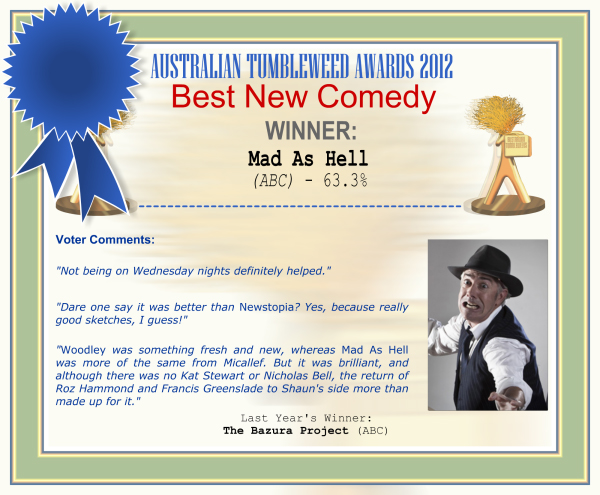
If the only problem you had with Mad as Hell was that it was similar – okay, very similar – to Micallef’s SBS series Newstopia, then realistically you should have been dancing in the streets for this series’ ten week run. Very smart and very, very funny, Newstopia was the kind of show that should have run for a decade; now reborn on the ABC as Mad as Hell, hopefully it will. C’mon here people, Micallef and company (especially writers Gary McCaffrie and Michael Ward) are putting together pretty much the only comedy coming out of Australia that could remotely be considered “world class”, thanks to their ability to be funny (on pretty much any level they choose, from word play to gunplay to Micallef raising a well-timed eyebrow) and make a point – even if that point is “why is that woman wearing a riding outfit?”. Micallef has found a format that works for him and if he wants to ride it into the ground for the next twenty years, hey, that works for us too.


It’s uncertain whether The Hamster Wheel will return this year (although Julian Morrow and Craig Reucassel are due to host a new consumer affairs program called The Check Out) and that would be a shame because it’s been a consistently funnier series than The Chaser’s War on Everything, thanks to better research and the almost complete absence of pranks. Focusing on the media seems to have brought out a much-appreciated mean streak in the team which we hardly ever saw in their political work: presumably the ABC’s insane desire for “balance” when it comes to attacking politicians held them back in a way that doesn’t apply when it comes to sinking the boots into commercial current affairs shows and newsroom clichés.

For once the three finalists in this category were satirical programs – a welcome change after a number of years in which quality satire has been at a premium on Australian TV, with 7.30’s Clarke & Dawe being the lone standard bearers. Many were outraged at the ABC’s plans to axe the veteran duo’s long-running weekly segment, but it now looks like Clarke & Dawe will stay on air (just not on 7.30) so that’s something.
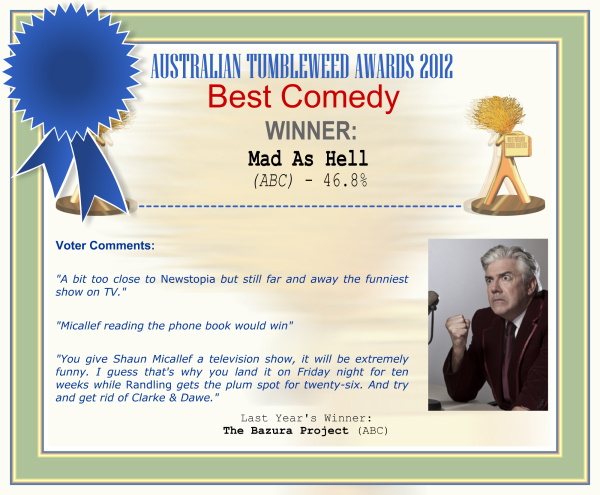
The winner of this category was always going to be Mad As Hell, a sketch show which brilliantly combined the surrealism of The Micallef Program with the satire of Newstopia. It will be back this year and is sure to be one of the TV comedy highlights.
Usually here is where we’d make our predictions for 2013, but it’s already been announced that Spicks & Specks is coming back: we can’t top that. Remember this announcement from the ABC?
After seven years, 277 episodes, more than 150 special guests, and thousands of questions, Australia’s favourite music quiz show Spicks and Specks will come to an end in 2011, as host Adam Hills and team captains, Myf Warhurst and Alan Brough, decide to call it a day.
We’re still waiting for the press release announcing its return that begins:
After seven years, 277 episodes, more than 150 special guests, and thousands of questions, Australia’s favourite music quiz show Spicks and Specks will return to our screens in 2013, as we realised that host Adam Hills and team captains, Myf Warhurst and Alan Brough had nothing to do with the show’s success really and… c’mon guys, Spicks and Specks! It’ll have the same opening music and set! What more do you want?
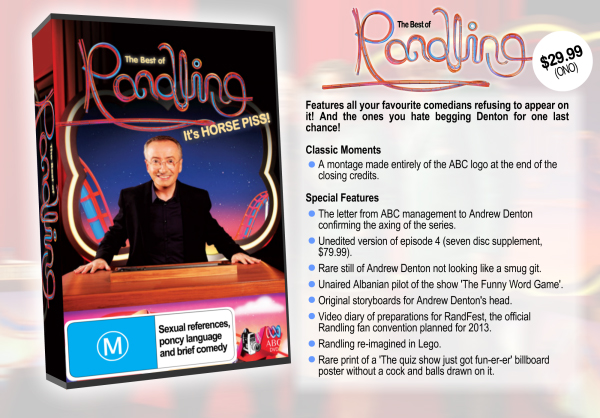
Okay, so your chance to vote in this year’s Tumbleweeds Awards is almost over, and if you haven’t voted by now* there’s a good chance you never will. Which, let’s be blunt, would be a massive mistake on your part.
Let’s explain: some years it’s pretty clear that Australian comedy just stank up the place and these awards are just making it official. Other years there was enough good stuff around that avoiding the bad was surprisingly easy and we’re just making sure the stinkers don’t crawl away unnoticed. 2012 fell into neither category.
Instead, 2012 was a year full of crap that people are already talking up as some kind of new Golden Age. Don’t believe us? Check out the fine work of TV blogger and radio commentator Steve Molk:
Snuck under the radar: The return of Australian comedy to TV – particularly the ABC
(Notable mentions: Santo, Sam & Ed’s Sports Fever [Ch7/7mate]; Southland [Ch9]; Can Of Worms [Ch10]; Laid S02 [ABC1]; The Strange Calls [ABC2]; The Unbelievable Truth [Ch7]; Adam Hills In Gordon Street Tonight S02 [ABC1]; Mabo [ABC1]; Episodes [Ch9]; Good Game [ABC2].)
Problems. A Moody Christmas. The Warehouse Comedy Festival. Kane and Disabled. The Hamster Wheel. Shaun Micallef’s Mad As Hell. The Strange Calls. Woodley. Laid. Agony Uncles/Aunts. Outland. Danger 5. The Roast. Audrey’s Kitchen. Even Hamish & Andy’s Euro Gap Year. It’s building and we’re well overdue the return of good Australian comedy to our screens – the crop we received this year was plentiful and we want more. MORE, DAMMIT – MORE!!!
Far be it for us to point out that there was roughly the same amount of Australian comedy on our screens back in 2011** and that the overall improvement in quality was pretty much non-existent (basically, we lost Talkin’ ’bout Your Generation and gained Randling), even though that’s pretty much our job here. More importantly, who in their right mind wants more of Laid or Problems? Oh wait, this is the guy who’s website is “Challenging opinions of today’s TV” – presumably he meant to write something like “Challenging your opinions of today’s TV” – and yet his preview of Problems contained this example of Olympic-level fence-sitting:
“this sneak peek at Problems offers us an insight in the level of risk the ABC took in commissioning the series and just how well it’s going to pay off.”
Of course it “offers an insight”. So does literally everything else that had anything to do with the show, up to and including a photo of an empty set. If you’re going to be a critic and not just the network’s friend, you yourself have to offer up your own insights. It also helps if they’re not the same as every other fence-sitting critic (you didn’t like Randling? Uh yeah, that bandwagon left six months ago) and they don’t involve you tweeting at every television personality you can find trying to make friends with them.
The important thing is, whatever our issues with him Molks is one of the more high profile online television critics in Australia and he’s telling you that 2012 was a great year for Australian comedy. He’s not alone: how else to explain Fairfax claiming that the best Australian comedy program of 2012 was Agony Aunts / Uncles? We’ve ranted about this debacle before, but seriously: if that’s the highwater mark for the year, then the year was spent in the stinking remains of a drought-drained swamp.
So let’s be blunt: if you don’t vote in this year’s Tumbleweeds, you’re saying you have no problem with what these people are putting out there. They’ve already had their say about the state of Australian comedy in 2012, and the obvious sacrificial lamb aside – that would be Randling, a dud so massive even Australian television critics had to acknowledge it – they liked what they saw. First class stuff all round guys, pat yourselves on the back for a job well done. “The crop we received this year was plentiful”. Certainly sounds like a big thumbs up to us.
We, as usual, would beg to differ. We certainly hope you do too.
*Your online voting form can be found here: https://www.surveymonkey.com/s/tumblies2012votes
**That Fairfax “best and worst of 2012” TV list actually complained about the lack of Australian comedy on our screens in 2012. C’mon guys, you can’t both be right!
Voting is open in this year’s Australian Tumbleweeds 2012. Now in its 7th year, the Australian Tumbleweeds hails the failures (and occasional successes) of this nation’s comic talent.
Your online voting form can be found here: https://www.surveymonkey.com/s/tumblies2012votes
You have until midnight on Sunday 6th January 2013 to vote. Please only vote once. Full rules and instructions can be found with the voting form.
The winners will be announced on or about Australia Day.
As always, the official Twitter hashtag is #tumblies.
While you’re thinking about your nominations for this year’s Australian Tumbleweeds Awards, we want to draw your attention to this blog about the “Royal Prank” and the consequent suicide of Jacinta Saldanha. It highlights some of the issues we’ve been thinking about over the past couple of days, including the culture at Austereo radio stations that seems to be as much, if not more, to blame for Saldanha’s tragic death. You can lay blame the DJs, or the producers, or management, or the hospital’s patient privacy policy, but the real problem is the source – and unfortunately it’s the hardest to fix.
Britain’s Leveson Inquiry into the culture, practices and ethics of the British press, sparked by the News International phone hacking scandal, shows us that while it’s not exactly a waste of time investigating the problems with the culture of an industry or organisation, there’s also not much you can really do to change it. A week or so after Leveson’s report was published Britain’s tabloid reporters were harassing Saldanha and her colleagues about the Royal Prank. Why? Because it’s how they get the stories to attract the readers to buy the newspapers they write for.
Similarly, in Australian commercial radio the job of the DJs is to come up with content that will keep the audience listening and phone pranks involving famous people are very much that. Sure, they get lawyers to look over anything that might be controversial, but in most cases it’ll be fine. If the Royal Prank hadn’t resulted in a suicide it’d be largely forgotten by now, even if the Police and ACMA had still decided to take an interest in it.
Audiences are pretty annoyed, of course, although probably not the regular listeners to 2Day FM to whom the station’s content is rigorously targeted. Sponsors may be withdrawing due to public pressure online, but once the fuss settles down they’ll probably come quietly back and everything will be back to normal. The problem, as the above-mentioned blog from The Preston Institute says, is the Austereo culture, and it’s unlikely to change: “I think they’ll just continue to live out their Mad Men fantasies, down another drink and continue to manage the PR.”
More likely to do some damage to Austereo are the hacking group Anonymous, who Mumbrella reports have made threats against the company. But any actions the group take are unlikely to result in the ongoing cultural change needed at the organisation. That would require an unlikely-to-occur mix of swiftly falling ratings, decreased sponsorship revenue, a courageous management team and attitudinal change amongst the station’s key demographics, and Anonymous’ incredible hacking skills can’t deliver that.














































